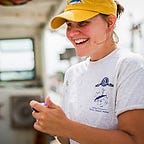How to support kids interested in trades.
I encouraged my kids to call their lobster business Next Generation Lobster Co. so they could exploit the fact that they were kids who caught and sold their own lobsters. And it worked. They could sell 100% of their lobsters to friends, family, neighbors, and strangers this summer.
We do not have a robust next generation ready to take the helm, and many of the fishermen in Maine today are, well, getting old.
Why aren’t there more kids? Lots of reasons.
- Fishing is not considered a good business opportunity, which is, in fact, incorrect. Fishing, and learning to fish, is a great way to explore different skills and experiences and can be a great platform for building a successful (and lucrative) business.
- There are not a lot of programs that support students interested in becoming fishermen. There’s the lobster apprentice program here in Maine, but compared to the opportunities made available to young farmers, there’s barely any support for young fishermen. The USDA offers the New Farmers and Ranchers Program, Beginning Famers, mentor programs, and access to funding and business planning for anyone interested in becoming a farmer. (Thank goodness collaborations like the Fishing Communities Coalition are working on the Young Fishermen’s Development Act.)
- Kids are not getting on boats nearly enough. Whether kids are interested in engine repair, maintenance, fishing, salvage, aquaculture, charters, or science, there should be more opportunities for them to get on the water NOW. Get kids on the water!
- Fishing is so dang expensive. Like, so expensive. This is not talked about nearly enough. Fishing licenses and permits, depending on the fishery, can be upwards of $100,000. Buying gear like nets, traps, ropes, etc., can also cost almost $100,000. Boat insurance, boats, boat maintenance? Also, at least $100,000. When there’s even an opportunity to access a fishery, the cost of entry is very high.
- And this is my own opinion, but I think “modern” parenting styles are making it nearly impossible for kids to explore opportunities that exist away from a desk. Sure, sitting behind a desk can seem safer or less risky, but that doesn’t allow anyone to explore jobs that might put them in risky situations — whether that’s the military, fishing, or whatever. Getting behind the wheel of a 45-ft boat at the age of 11 in the middle of the Gulf of Maine is nerve-wracking but necessary and oh-so-rewarding when you get the boat home. Kids aren’t fragile, y’all, and putting them in situations where they make mistakes, learn, and fail is really good for them. It will help them become productive adults who can adapt to many different situations, say, the next pandemic.
I’m not one to present problems without solutions, so here ya go:
- If you’re interested in learning more about fishing, at any age, find organizations like the Maine Coast Fishermen’s Association that can help you find paths and opportunities to achieve your goals. There are similar organizations in other states like the Cape Cod Fishermen’s Alliance, Gulf of Mexico Reef Shareholders Alliance, and Alaska Longline Fishermen’s Association.
- Go to places like Portland Shipyard and Portland Yacht Services Inc., or a boatyard or marina in your area, and learn more about positions they have available, what you need to learn to work there and ask if they can help point you in the right direction to find good training.
- Check out the Maine Marine Trades Association and learn more about their efforts and partners. (And, of course, there are other trade associations across the country.)
- Southern Maine Community College, University of Southern Maine, University of New England, and Maine Maritime Academy all have excellent programs to prepare students for all sorts of careers in marine trades, marine bio, and other technical careers.
- Let your kids do VOC! VOC is short for vocational-technical school. Many high schools in Maine offer VOC starting junior year. There are also post-secondary VOC programs available at many adult education learning centers. VOC helps students train for specific jobs, often trades that are hands-on or in healthcare.
Last but not least, tell your kids to get outside and off their phones!
